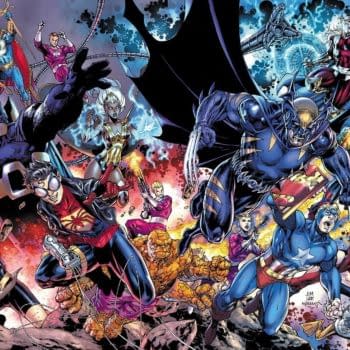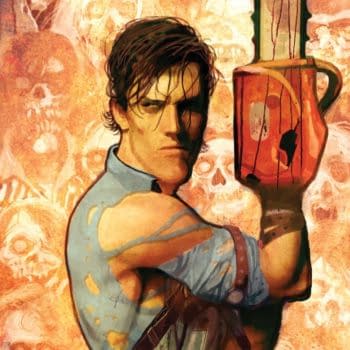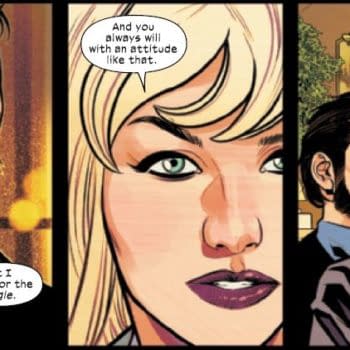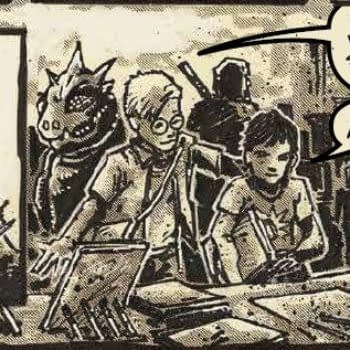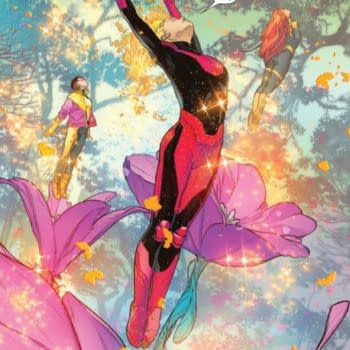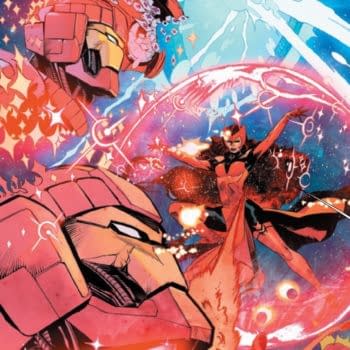Posted in: Comics, Review | Tagged: Comics, dc
Geek Girl On The Street Reports: Joan Hilty On Being A Woman At DC Comics
Joan Hilty worked for DC Comics as an editor for 15 years. "I worked in every corner of DC's editorial universe. I'm steeped in it," says Hilty of her time at one of the "big two" comic publishers. "I started out as an editor in the trading cards department, I briefly moved over to Vertigo – then because of my licensing experience I went to DCU for a while to edit the kids line that included the Warner Brothers licensed books and the Cartoon Network franchise that included the Power Puff Girls. And, then I went back to Vertigo to work on editing original graphic novels."
While at DC, she edited titles such as Sandman Mystery Theater and Gotham Girls – and, worked on several superhero books, including Blue Beetle, several different Batman titles and Manhunter. As we learned from Louise Simonson, women editors of superhero titles are rather rare in the comics industry. So when I caught up with Joan at Baltimore Comic Con I took the opportunity to corner her for a few minutes to talk about her experiences as a woman working in mainstream comics. Below is our chat.
When did you start in comics?
I started in comics well before [I started at DC], I had always drawn and illustrated. I did a lot of illustration in college, I was a visual arts major. I was always a cartoonist – when I got out of college I tried to peddle a syndicated strip, I didn't quite make it, but I fell into the alternative comic scene in San Francisco and met a lot of wonderful people that way. I published in a lot of small title press there for a while, you know RipOff Press and Fantagraphics, I currently do an ongoing comic strip called Bitter Girl, I've done that strip for ten years.
Based on when you started in comics and now: How do you feel the representation of women in comics has changed in the industry based on that span of time?
Well, I think that the challenges are still there, but the tools that make it easier to access comics have become easier to use in terms of the digital revolution, in terms of being able to connect with each other and form networking groups. It used to be that it was pretty much the occasional listserv, or far flung organization like Friends of LuLu, maybe one token panel at a comic convention, if you were lucky. We just didn't get that many opportunities to meet each other, unless you were already a part of a comics collective, like Wimmen's Comix… There are just so many more opportunities and avenues to network. Which as Laura [Martin] was just telling you, is the most crucial thing of all.
Listen up, Bleeding Cool readers – if you want to make it in comics, regardless of your gender, networking is where it's at.
I haven't really looked at the numbers, but I think that there are more women [who have been employed] in editorial during the last five-to-ten years at DC then there ever were in the history of the company, before. There was always a fair amount of female editors, but the representation of women still lags on the creator side.
I was asked to talk to someone at Vertigo about why there are so many female editors, but not a lot of female creators. It seems really disproportionate.
It was pointed out to me at the Harveys last night that there were no female presenters! I'm sorry to say that I've been in this business so long that I did not notice that.
Oh wow, I didn't notice it either!
I believe the only woman who came up on stage and spoke was Judy Hansen, accepting for…
Scott Pilgrim, Oni Press – accepting for Bryan Lee O'Malley.
Yup, on behalf of Bryan Lee O'Malley for Scott Pilgrim. And, that's a problem.
Despite the fact that there are more women in the comics industry than there ever were before, seriously, it's still a very uneven playing field. There are predominantly more men, it is a boy's club… What change needs to happen within the comics industry to make it a more even playing field so it isn't so intimidating for women to get involved?
It's mainly an uneven playing field – comics is actually a really broad playing field, right? There's the superhero business, the indie business, right? The playing field is the most uneven in the areas that earn the most money for the people who work within them. The top dollar fields are where there needs to be change…
This series is focusing mostly on the superhero genre, why there aren't so many women who want to create or read superhero comics. Let's look at the big two, what kind of intrinsic change do you think needs to happen within DC Comics or Marvel to make it more equitable for women who want to write superhero books?
You're making me stick to the superhero genre? Okay. That's tricky, because it does go fundamentally to the nature of the superhero genre, which is not to say that women don't like the superhero genre – women do – but, in lesser quantities than men, especially in the most traditional models of superheros. The superhero stories that are more genre bending, that are also true crime books, horror books, romance books – those books that mash it up, really work [for women]. And, there are works of fiction that guys rhapsodize about, like The Brief Wonderous Life of Oscar Wao by Junot Diaz – that sort of have a superhero sensibility to them through the [main character's] fantasy life. There are tons of works of literary merit that sort of apply the same fantasy concepts to female readers who are an enormous part of the book buying market.
In traditional fiction it's 60% women to 40% men who do the most buying. In comics it's the opposite, right?
It is, and I'm biased right now, because my focus is on graphic novels and not on superhero stuff. Graphic novel adaptations are more of my interest right now and I think that, really, those just need to command more of the market. Superhero books need to expand more consistently into spin-off series [which are more appealing to women]. I understand that DC is reprinting the Chase mini-series from the 1980s that was very, very ahead of its time for essentially being a detective series about a woman happened to be telekinetic. And, she interacted with superheroes in all the superhero books, but you also have this opportunity to create a fan-base for that female character outside of the Justice League. It's also essentially what DC did with Gotham Central, which was about the Batman franchise, but they wanted to spin-off this thing which could be read like a police show.
One of the things which someone brought up to me was that they'd like to see a Batgirl, Inc. comic about all the different women who have played Batgirl coming together to form a detective agency. That would be an interesting book to read, I think – and, it's curious to me why DC has never done something like that.
And again, you don't necessarily look to superhero models to [create that series], you look to what young women pick up in droves – which is anything that Alloy Entertainment publishes, or the Twilight series… And, again, there are some efforts which are almost there, but not quite, like trying to hook Janet Evanovich's name to the graphic bandwagon with Troublemaker, – but, again, at least those are action-adventure stories that you would have only traditionally associated with male readers wanting to read.
Why do you think that action-adventure is predominantly associated with the male audience? When those are pretty traditionally the types of titles – action-adventure, detective-y stuff – that women go after?
Fundamentally, the superhero genre still hangs onto its market by hanging onto fairly dated tropes of costume, world saving and authoritarianism – and, gender politics where you can deal with and explore the theme of rape in a story, as long as it is visited on a female character and not a male character, never-ever-ever a male character. There is a certain conservative ethic to the superhero genre that works in favor of a patriarchal society.
Do you think that is why female creators are less interested in writing/drawing superhero stories?
Yes. I do think recently that there has been a fair amount of outreach made to female creators. That's not to say that I'm letting [DC and Marvel] off the hook for specifically doing more of that outreach, because they really do need to – there is a lot of preferential networking which is done with guys that publishers need to be really careful about. But, it is true, that [women] are not being asked to tell the kinds of stories that they would find interesting. And, for guys, it's the same kind of fantasy of being the alpha male being told over and over again… And, yes, women do like to have an alpha female fantasy every now and again, too – but, not in as high a quantity as men do.
What could publishers do to make superheroes more inviting to women, both as creators and as fans?
Recruiting, absolutely. And, not just recruiting not just from the ranks of successful female fiction writers, but recruiting from the ranks of female non-fiction writers, artists, anyone with a really funky point of view, political commentators… You know, Rachel Maddow would write a ass-kicking comic book…
Oh my god, I love Rachel Maddow, I would totally buy that book!
Also, I think this is where you have to be careful because you don't just want to be hiring women to write for women.
Like a quota thing? That would be bad, we don't want that…
But, basically you want to give women an opportunity to tell stories that really excite them. You want publishers to say stuff like "If you could write your version of Green Lantern, make a sorta female savior of the universe that had to curb her ego to take on her mantel, how would you do that?" I think that if publishers did that, women would come up with some really really interesting answers. So you do it not by saying "Give us your version of Green Lantern" but, "If you were presented with that mythos, how would you write it?"
That's something that I need to think about, that's really interesting. That's actually something I think I might need to write more about.
You might.
What classic superhero would you bring back into the modern universe?
Oh geeze, and this can be any… ?
Anyone.
Is Big Barda dead still? Or is she alive?
I don't think she's alive. I don't know, though.
I was always kind of a Big Barda fan, from the Keith Giffen days where she was kind of the head of the household, having to be reminded of what it's like to have human relationships, because she's so used to being the commander of a death squad… I'd say Big Barda.
If you were going to walk into DC today and pitch a new female superhero, what would that superhero be?
Oh my god! A super-powered Prime Suspect, or super-powered In Plain Sight – and again, we're talking about those types of stories with strong female lead characters which mashup different storytelling genres.
What advice would you give to women who want to work in editorial at Marvel or DC?
Network equally with artists and writers in the comics industry. Take advantage of the digital age to market your distinctive point of view. Have a broad understanding of what types of books – not just what types of books superheroes comics fans read, but what genres pop-culture consumers read. Don't be intimidated by the unconscious networking, unconscious or conscious sexism and the occasional double standards of the industry. Where, you know, guys can rise within each other's in each other's favor without having people gossip about them, but women in the industry are often subjected to pillow talk. It's really irritating, but don't be intimidated by any of it.
That's really interesting. One of the things that Kyrax2 said to me was that she thought that one of the reasons why more women aren't working at companies like DC was because of that unintentional kind of networking, were a guy can do that kind of pally-assertiveness thing, but if a woman does it it is a come on. And, I can see that this happens, but it's never happened to me because I'm always just one of the dudes…
Well, speaking for myself it always helped to be an out lesbian, too. Just, you know, presenting the whole menu of options… [laughs].
Next week we chat with Harvey nominated superhero colorist, Laura Martin.
Kate Kotler is a lead writer for the Geek Girls Network, a writer of the"Daily Dozen" for Wizard World Digital and the co-author of Bleeding Cool's KYPO (geeky dating advice column). She loves Doctor Who, Frank Miller, Wonder Woman, knitting, puppetry and she used to be a professional fire eater. See her full resume and bloggy ramblings on katekotler.com or Tweet at her @adorkablegrrl on the Twitters.






